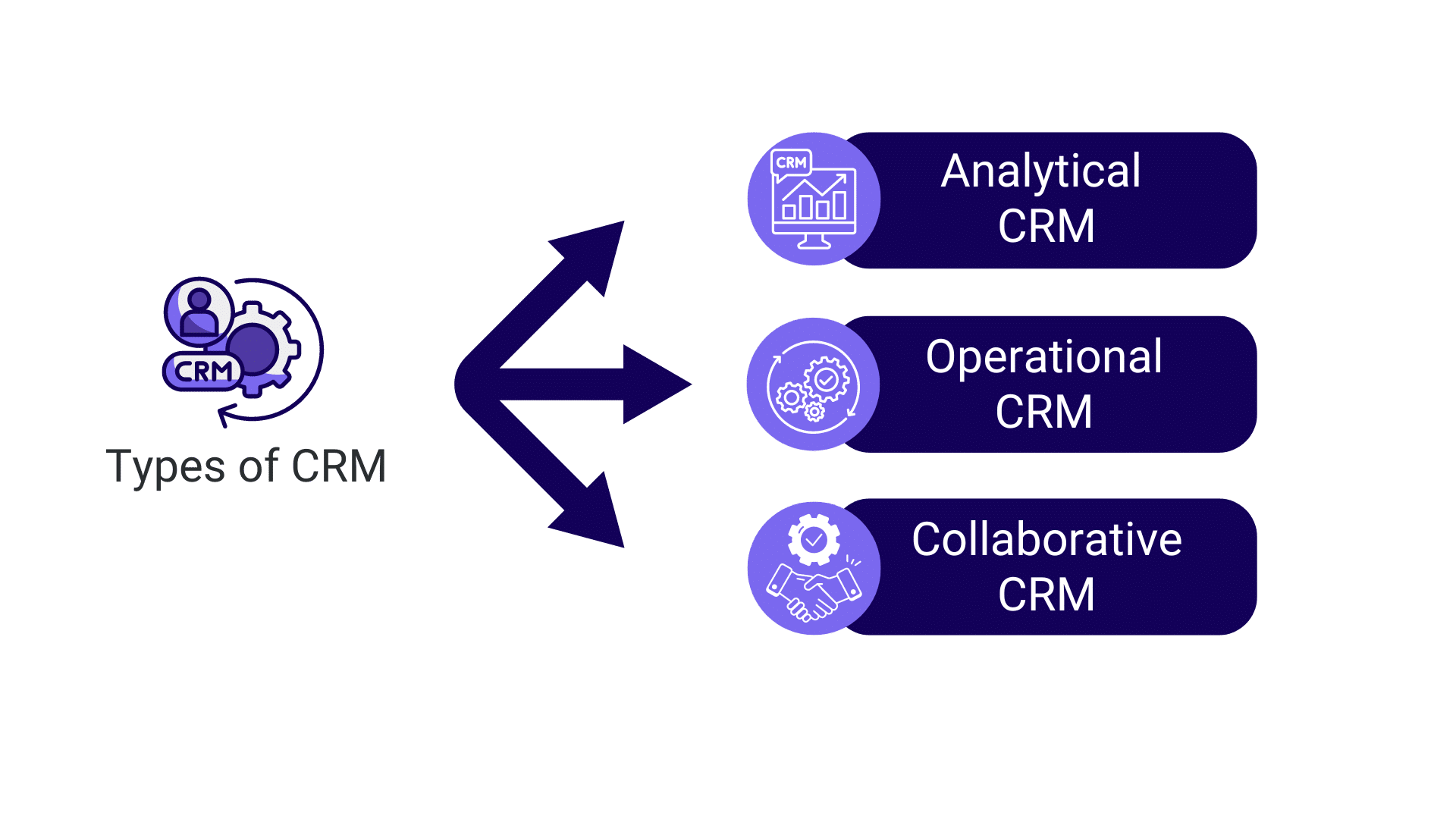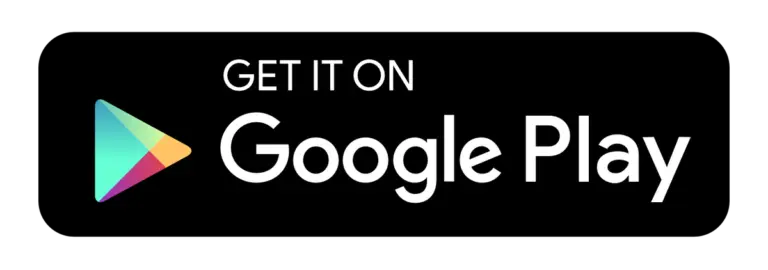
Simply put, it’s software that helps you keep track of all your customer data and interactions. Think of it as a centralised hub where you store everything from contact details to purchase history, making it easier to manage leads, close deals and keep your cash registers ringing. In short, CRM software is your go-to tool for building and maintaining strong customer relationships.
But with so many types of CRM out there, how do you know which one’s right for your organisation? In this post, we’ll give you a quick overview of the different CRM types to help you decide for yourself which option checks all the boxes.
When it comes to CRM software, one size doesn’t fit all. Your business needs differ from those of other businesses, so you need to know the various types of CRM systems available. Let’s look at the most important ones.
An operational CRM simplifies your daily tasks and makes your work life easier. For instance, it can help manage customer interactions across different channels — like sales, marketing and customer service — so you can provide a smooth and consistent experience for your customers. Here’s how it works:
Sales management | Marketing automation | Customer service | Workflow automation |
Track leads from the first touchpoint to the last | Create and schedule marketing campaigns with just a few clicks | Manage support tickets efficiently, ensuring every customer query is addressed on time | Streamline routine tasks like data entry, freeing up time for your team to focus on more important work |
Automate follow-ups, so you never miss any potential sales opportunity | Segment your audience, so you can send targeted messages that resonate | Automatically assign tickets to the right team members, speeding up response times | Set up automatic reminders for follow-ups, so you never miss one |
Keep detailed records of customer interactions for more personalised communication | Monitor the performance of your campaigns in real-time, allowing for quick adjustments | Keep a history of all customer service interactions, making it easier to resolve recurring issues | Integrate with other tools in your tech stack, creating a seamless workflow across your organisation |
In short, operational CRM can be the backbone of your customer-facing activities by ensuring that every interaction, whether it’s a sales call, marketing email or support query, is handled in a smooth and efficient manner.
While operational CRM helps with managing day-to-day tasks, an analytical CRM is all about getting to know your customers on a personal level. It collects and organises customer information from various sources, giving you the tools to analyse all that data and uncover valuable insights. Here’s how it can help your business:
Data collection | Customer segmentation | Trend analysis | Customer insights | Performance metrics |
Gathers data from customer interactions, sales history, social media and other channels | Break down your customer base into different segments based on behaviours, preferences and purchasing habits | Identifies trends and patterns in customer behaviour, such as seasonal buying habits or preferences for certain products over others | Makes it clear why certain customers are more loyal, in turn, enabling you to replicate those factors across your broader customer base | Provides detailed reports on the effectiveness of your marketing efforts, customer service and sales processes |
Centralises this information, making it easier to access and analyse | It helps you identify which products or services resonate most with specific groups | This way you can anticipate customer needs and adjust your offerings accordingly | Helps you roll out loyalty programs or personalised offers that strengthen customer relationships | Measure ROI, identify areas for improvement and make data-backed decisions for your business |
In essence, analytical CRM gives you a magnifying glass to see the bigger picture of your customer relationships. By utilising the CRM metrics and understanding the data behind customer interactions, you can make smarter decisions that enhance customer satisfaction, tailor your marketing strategies and ultimately boost your sales.
A collaborative CRM ensures that different departments — like sales, marketing and customer service — are always on the same page when it comes to managing customer relationships. Here’s how it benefits your business:
Seamless communication | Unified customer view | Customer feedback sharing | Improved team collaboration | Partner and vendor collaboration |
Automatically shares information across departments, so everyone has access to the latest customer data. | Creates a single, comprehensive view of each customer, combining data from various departments. | Allows customer feedback to be easily shared across departments, ensuring that everyone stays informed about customer sentiments. | Breaks down silos between departments, fostering a culture of collaboration and teamwork. | Extends beyond internal teams, allowing for better collaboration with external partners, vendors and stakeholders. |
For example, when the sales team closes a deal, the customer service team is immediately informed, ensuring they can tend to the customer’s needs from day one. | Gives teams a 360-degree view of the customer journey, making it easier to provide consistent and personalised service. | Helps the marketing team understand what products are clicking with customers, aids the sales team in adjusting their pitches and allows the customer service team to address any concerns promptly. | Ensures that all teams are working towards the same goal: delivering the best possible experience for your customers. | Ensures that everyone involved in delivering your product or service is on the same page, improving overall efficiency. |
While the main types of CRM — operational, analytical and collaborative — cover a lot of ground, there are also more specialised categories that serve specific needs. As mentioned earlier, these might not be as widely used, but they can be quite useful for certain businesses.
Let’s take a closer look at some of these CRM types.
Work isn’t confined to the office cubicle anymore, so why use a CRM that only works on a laptop or desktop? Whether your team is out in the field meeting clients or travelling for business, they need to access the CRM on the go. Start using a mobile CRM, which is designed to give your team access to customer information, sales data and communication tools right on their smartphones or tablets.
Imagine being able to check a client’s history just before walking into a meeting or updating a lead’s status immediately after a conversation. Mobile CRM ensures that your team stays connected and productive, no matter where they are. It’s all about making sure your business runs smoothly, even when you’re on the move.
As WhatsApp becomes more popular for business communication, there’s a growing need to integrate it with CRM systems. WhatsApp CRM provides you with the capability of managing your customer interactions on WhatsApp directly from your CRM software. This is particularly useful for businesses that rely on quick, personal communication with their customers, such as small businesses, startups or those in regions where WhatsApp is widely used.
With WhatsApp CRM, you send messages, respond to inquiries and even automate follow-ups, all while keeping a record of these interactions within your CRM. It’s a powerful tool that will help streamline your CRM process and keep your brand close to customers without sacrificing the human touch.
Strategic CRM takes a long-term view of customer relationships. Instead of focusing on individual transactions, it’s about understanding your customers deeply and developing strategies to build long-lasting relationships with them. This might involve segmenting your customers into different groups based on their behaviours or needs and then tailoring your approach to each group. For example, you might create loyalty programs for your most valuable customers or develop personalised marketing campaigns for each customer segment.
Strategic CRM is about seeing the bigger picture and planning how to nurture customer relationships over time, which leads to higher customer retention and stronger brand loyalty in the long term.
Pro Tip: Regardless of your chosen CRM software, you should be familiar with the must-have CRM features.
B2C CRM or business-to-consumer CRM software is specifically designed to help businesses serve customers rather than other businesses. What does it do? It helps collect and organise data. It doesn’t just collect transactions; it gathers every interaction, purchase and piece of feedback to create a comprehensive view of each customer.
Here’s how B2C CRM transforms your business approach:
B2C CRM is about diving deep into your customer data to not only meet but anticipate customer needs. This way you can ensure that you’re not just reacting to the market, but actively shaping how your customers see and interact with your brand, building lasting relationships and driving growth.
By now, you should have a clear understanding of the different types of CRM and how they can benefit your business. You can choose from analytical, operational or collaborative CRM, depending on what you aim to achieve.
Choose analytical CRM if you want to get a deeper understanding of your customer data, uncover key insights and make informed, strategic decisions
Choose operational CRM if you are focusing on streamlining and automating daily tasks across sales, marketing and customer service
Choose collaborative CRM if you want to enhance teamwork by ensuring all departments have access to up-to-date customer data, leading to a better overall customer experience
Start using Telecrm, a powerful, user-friendly CRM designed specifically to help businesses like yours manage customer relationships much more smoothly and effectively. Here’s how Telecrm stands out from its competition:
Integrated telecalling: Manage all your calling activities directly from within the CRM. Track calls and automate follow-ups, and thus never miss a lead again.
WhatsApp integration: Communicate with your customers directly through WhatsApp, with all interactions captured in the CRM for easy reference.
Lead management: Capture, track and nurture leads effortlessly. With Telecrm, say goodbye to lost opportunities and hello to stronger connections.
Sales automation: Automate repetitive tasks like sending follow-up messages and reminders so your team can focus most of its time and energy on closing deals.
Customisable workflows: Tailor the CRM to your specific needs by adding new workflows and tweaking existing ones without any significant effort.
Real-time analytics: Gain insights into your sales performance and customer interactions with detailed reports and dashboards.
Whether you’re about to get your first-ever CRM or looking to upgrade your current CRM system, Telecrm offers the features and flexibility you need to succeed. Sign up for a demo today and see for yourself how it can transform the way you manage your sales activities.
Related Read: What is CRM? Features, Types, Benefits and More!


© Copyright 2025 Telecrm.in - All Rights Reserved • Privacy Policy • T&C


© Copyright 2025 Telecrm.in - All Rights Reserved • Privacy Policy • T&C